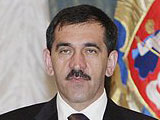Ingushetia: Counterterrorism Failure
By Simon Saradzhyan for ISN
A suicide bomber rammed the gates of Ingushetia’s Nazran district police headquarters with a minivan and then detonated a powerful bomb inside the vehicle in a terrorist attack that killed at least 21 and wounded more than 140 on 17 August.
The yellow Gazel van was stolen two days prior to the attack. Ingush law enforcement knew that it might be used for a terrorist attack, yet, in spite of numerous police cordons in and around Ingushetia’s largest settlement, the car bomb was successfully deployed at the headquarters during the time when most of the police personnel were attending a morning briefing in the yard.
The bomber’s accomplices then opened fire from spots nearby, killing more officers who were trying to escape the scene, according to Russian media reports.
The bomb, which had a yield equivalent of 1 ton of TNT, nearly destroyed the building, which was built from scratch after terrorists, aided by rogue police officers, destroyed the old headquarters in a 2004 raid. In spite of the continuing terrorist attacks in the republic, the new building lacked basic counter-ramming and other security features.
The selection of the target and execution of the attack indicate that the bombing may not only be an intelligence failure, but also a counter-intelligence failure. The terrorists are likely to have relied on accomplices in the police force to learn the time of the briefing and position gunmen to open fire after the explosion.
Russian President Dmitry Medvedev acknowledged such a possibility when ordering the investigators to look into whether there was “sloppiness" or “betrayal” in the incident.
There has been plenty evidence of bent Ingush officers assisting local insurgents, and yet, authorities have failed to deal with this phenomenon, which multiplies the terrorists’ capabilities.
Every major successful attack by the North Caucasus-based terrorist and insurgency networks triggers off a flurry of high-profile responses by the authorities, and the 17 August bombing was no exception.
Most of the measures ordered by Medvedev in the wake of the attack make sense, including improving interagency cooperation in counterterrorism initiatives; boosting pay motivation of police personnel; winnowing out the numerous 'compromised' officers; fighting corruption inside the force, including the practice of paying for promotion; and boosting security at law-enforcement buildings.
Medvedev also fired the Ingush police chief and put a veteran federal law enforcement official - who has more than a decade of regional counterterrorism experience, in charge of coordinating all law enforcerment in Ingushetia.
For his part, federal Interior Minister Rashid Nurgaliev ordered an increase in the number of semi-autonomous “temporary operational groups” made of federal policemen in Ingushetia.
Ingushetia has already seen local law enforcerment officers reinforced by federal specialists time and again. While these groups are presumed to be less corrupt than local officers, their operations in Chechnya have drawn accusations of unlawful violence toward the locals. Abuse at the hands of both local and federal officials assigned to Ingushetia is generally believed to be one of the reasons why locals have been joining insurgency and terrorist networks.
Other factors include lack of employment and education opportunities for the youth in Ingushetia, which remains one of the poorest of Russia’s regions, as well as continuing speed of militant Salafism, whose supporters advocate establishment of Islamic state in the North Caucasus.
While readily blaming militant Salafites, some of whom have either studied in Arab countries or are natives of these countries, federal and local officials are not so forthcoming when it comes to acknowledgement of indigenous factors behind local insurgency and terrorism.
On 17 August, Ingush President Yunus-Bek Yevkurov - himself still recovering from wounds received during a suicide bombing - claimed that the secret services of the US, the UK and Israel are behind the increase in attacks in an attempt to destabilize the North Caucasus to prevent Russia’s resurgence.
While beefing up counterterrorism capabilities after each major attack, federal and local officials have done too little to address the root causes and contributing risk factors. In the meantime, the insurgency appears nowhere near petering off in either Ingushetia or other parts of the North Caucasus, such as Chechnya, whose president Ramzan Kadyrov has convinced the Kremlin to formally end counterterrorism operations there, only to see a spike of terrorist attacks, including one attempt on his life by a suicide bomber and most recently two bicycle suicide bombings.
As Medvedev acknowledged when outlining the response to the Ingush bombing on 19 August: "Some time ago, we got an impression that the situation regarding terrorism in the Caucasus has significantly improved [...]. Regrettably, recent events have shown that’s not the case."
To make it the case, both the Kremlin and local authorities will do well to diversify their response to indigenous terrorism in the North Caucasus to address the aforementioned root causes and contributing factors behind this menace. And in Ingushetia’s case, they should also cease paying lip service to the need to fight corruption and start cleansing the local law enforcement of inefficient, corrupt and ideologically converted officers.

